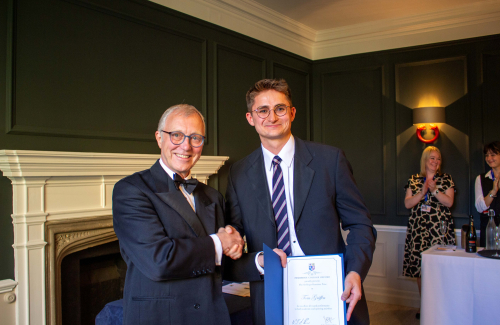More Pembroke news
Professor Alex Kacelnik Co-Authors Ground-Breaking Paper on Risk Sensitivity in Pea Plants
NEWS |
Pembroke Tutor in Biology, EP Abraham Fellow and Fellow Curator of Gardens, Professor Alex Kacelnik, is the co-author of a research paper receiving widespread media attention for its discovery that pea plants demonstrate the ability to ‘gamble’.
Scientists from the University of Oxford and Tel-Hai College, Israel, have shown that pea plants can make adaptive choices taking into account environmental variance, something hitherto unseen outside the animal kingdom.
In the study, published in the journal Current Biology, pea plants had their roots split between two pots, requiring them to decide which pot to prioritise as they grew.
The researchers first found that the plants grew more roots in a pot endowed with higher levels of nutrients – an adaptive response similar to animals allocating greater foraging effort to richer food patches.
Then, in a series of follow-up experiments, they split the roots of each plant between two pots that had equal average nutrient concentrations, but where one pot had a constant level and the other a variable level, asking whether plants would ‘prefer’ to grow more roots in one or the other.
Based on theoretical analyses of how decision makers such as humans or animals respond to similar choices, the researchers predicted that plants might prefer the variable pot (i.e. be risk prone) when the average nutrient level was low, and the constant pot (i.e. be risk averse) when average nutrient level was high. This is because when the average nutrient level is below what is required for the plant to thrive, the variable option at least offers the chance to ‘gamble’ on a run of good luck. On the other hand, when average conditions are good, it makes sense to take the safe option. The researchers discovered that this is exactly what the pea plants did.
Prof. Kacelnik commented: ‘To our knowledge, this is the first demonstration of an adaptive response to risk in an organism without a nervous system. We do not conclude that plants are intelligent in the sense used for humans or other animals, but rather that complex and interesting behaviours can theoretically be predicted as biological adaptations – and executed by organisms – on the basis of processes evolved to exploit natural opportunities efficiently.’
He continued: ‘We do not yet know how the plants’ sense variance functions, or even if their physiology is specifically adapted to respond to risk, but the findings lead us to look even at pea plants as dynamic strategists and to model their decision processes just as one would model an intelligent agent.’
News outlets across the world have reported on the findings of this research, including The New York Times and Science Magazine.
Professor Kacelnik was a guest on the BBC Radio 4 programme 'Inside Science' on Thursday 7th July, to explain more about the findings of this groundbreaking research. Listen from 23m30s here.

